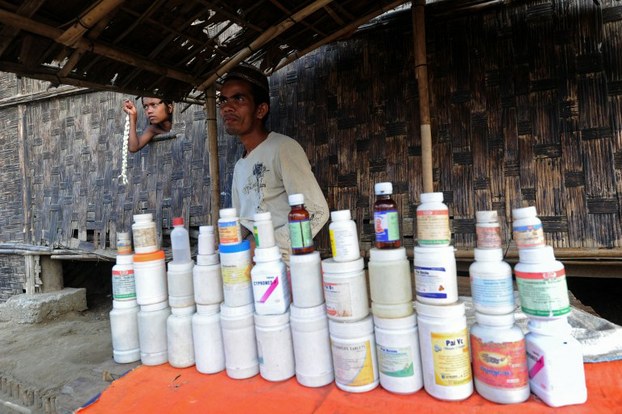




Authorities in western Myanmar’s conflict-torn Rakhine state will relocate offices of international aid groups in the state capital Sittwe that were attacked by Buddhist mobs late last month to a single area in the south of the city, local sources said Tuesday.
The United Nations World Food Programme (WFP) and other international nongovernmental organizations (INGOs) will reestablish offices on Union Street in southern Sittwe, ethnic Rakhine Buddhist community leader Than Tun told RFA’s Myanmar Service after a meeting with aid groups.
In addition to relocating, the aid organizations will also adopt measures that would make their work in the state more transparent to avoid any future misunderstandings with the local population, he said.
“We explained today that we want the U.N. and INGOs to discuss their work transparently with residents after their relocation in Sittwe,” Than Tun said of talks held in the capital on Tuesday among the aid groups, Rakhine state officials, and community representatives.
“The attendees agreed that the staff of the INGOs will display their organizational name tags when they travel around the city.”
Among the INGOs represented at Tuesday’s meeting were UNICEF, the International Committee of the Red Cross (ICRC), WFP, and Save the Children.
The talks follow March 26-27 riots that chased more than 170 aid workers from Rakhine state in the biggest disruption of aid in more than two years, according to the Associated Press.
In a rampage that saw a 13-year-old girl accidentally shot dead by police, mobs of hundreds of ethnic Rakhines ransacked and hurled stones at aid groups’ offices following reports that an aid worker had taken down a Buddhist flag.
Some groups’ offices were temporarily placed near Sittwe’s Basaya village following the attack.
Aid workers have warned of a growing humanitarian crisis for thousands of minority Rohingya Muslims living in refugee camps in the state following sectarian violence in the state in 2012.
The workers were providing assistance to 140,000 Rohingyas living in crowded displacement camps near the city of Sittwe and more than 700,000 other vulnerable people in remote, hard-to-reach villages, according to the Associated Press.
Some have tried to go back, but have been denied necessary permits, according to news reports.
Severe consequences
The U.N.’s human rights envoy to Myanmar Tomas Ojea Quintana on Monday warned that the absence of aid workers in the state could have dire consequences for life-saving work in Rakhine state, adding that it “will only increase the vulnerability of [the Rohingya] community.”
He called recent developments in the region the latest in a “long history of discrimination and persecution” against the Rohingya community, which he said “could amount to crimes against humanity.”
"These workers were in Rakhine state providing essential life-saving support, including health services, water and food to internally displaced persons, isolated villages, and other affected communities,” he said.
“The withdrawal of these workers will have severe consequences on the enjoyment of fundamental human rights, including the right to life.”
He warned that the availability of water could reach critical levels within a week in some displacement camps and that the impact on health care will be “particularly severe.”
The Associated Press quoted Ye Htut, the presidential spokesman, as denying Quintana’s allegations of discrimination against the Rohingyas on Tuesday.
“We totally reject his remark,” he told AP, noting that President Thein Sein had made it clear in recent discussions with the U.N. Secretary General that the government is committed to working closely with international aid groups.
He said that the government was informing aid workers that they can return to Sittwe and that local authorities would provide them with security.
Self-identification
Quintana also expressed concern about Myanmar’s first census in 30 years, which concludes on Thursday and has raised tensions in Rakhine state among Buddhists who fear that it may lead to official recognition for the Rohingyas.
The government considers Rohingyas illegal immigrants from neighboring Bangladesh, although many have lived in the country for generations.
He said that the government’s decision against self-identification of the Rohingyas in the census “is not in compliance with international human rights standards.”
Rohingyas are not among the 135 official ethnic races, but code numbers used on the census forms allow for the use of “other” which gives people the right to define their own identity in the allotted blank space.
Self-identification for the Rohingyas has been at the heart of past protests in Rakhine that led to violence and human rights violations for which the U.N. says there is yet to be accountability, and Quintana said the ongoing census “risks this cycle repeating itself.”
“Self-identification should constitute a pillar of the collection of ethnically disaggregated data. It is related to respect for the rights of individuals to assert their own identity,” Quintana said.
“To deny self-identification is therefore a violation of human rights.”
The U.N. says the Rohingya are among the world's most persecuted minorities.
Reported by Min Thein Aung for RFA’s Myanmar Service. Translated by Khet Mar. Written in English by Joshua Lipes.